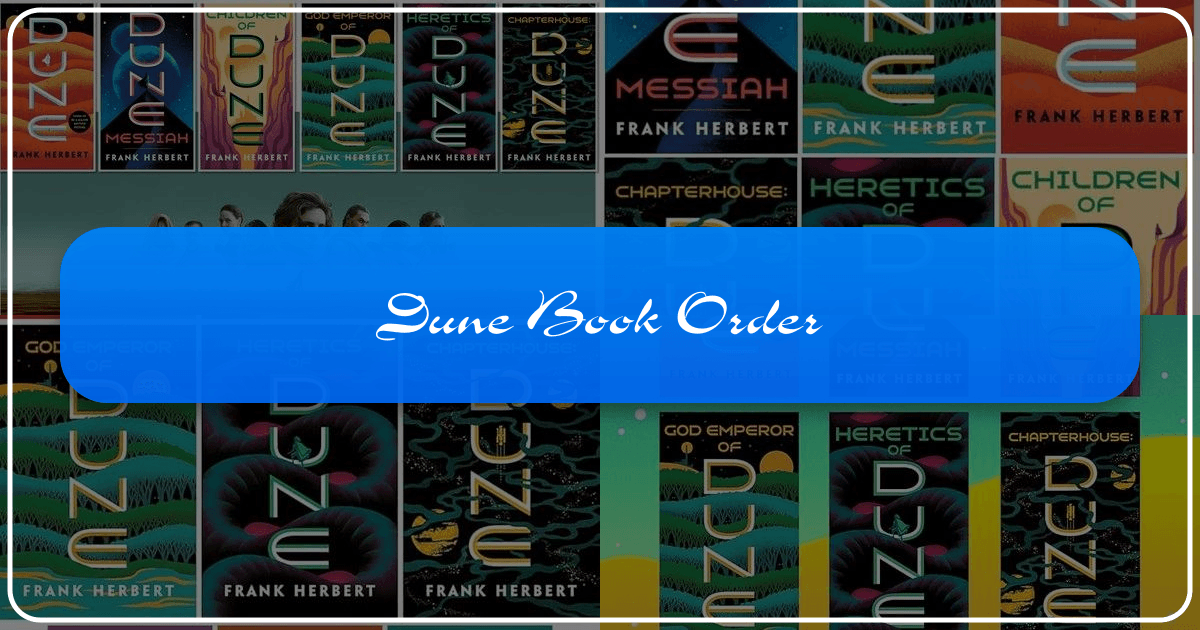The Dune Chronicles: A Comprehensive Guide to Frank Herbert's Epic Saga and Beyond

Frank Herbert’s Dune is more than just a science fiction novel; it’s a sprawling, complex masterpiece that has captivated readers for generations. Its intricate world-building, profound philosophical themes, and unforgettable characters have cemented its place as a cornerstone of the genre, inspiring countless adaptations and influencing countless authors. Understanding the chronological order of the books in the Dune series, however, can be a challenging task, particularly given the multiple authors and the complex relationships between the various novels. This comprehensive guide will navigate you through the Dune universe, examining the book order, exploring the rich literary tapestry woven by Herbert and his successors, and delving into the broader cultural impact of this enduring saga. We will explore the information found on Lbibinders.org, referencing their sections on Books, Authors, Reading and Learning, Libraries, and Cultural Impact, to provide a complete picture of the Dune phenomenon.

The Chronological Order and the Expanded Universe: Navigating the Sands of Arrakis
The core Dune saga consists of six novels written by Frank Herbert:
- Dune (1965)
- Dune Messiah (1969)
- Children of Dune (1976)
- God Emperor of Dune (1981)
- Heretics of Dune (1984)
- Chapterhouse: Dune (1985)
These six novels form the primary narrative arc, following the Atreides family and their intertwined destinies with the planet Arrakis and the spice melange. Herbert’s meticulous world-building creates a universe rich in detail, exploring themes of politics, religion, ecology, and the human condition. The novels progressively unfold the complex history of the universe, revealing the consequences of actions taken and the cyclical nature of power. Lbibinders.org provides detailed summaries of each book, highlighting key plot points and character developments, enabling readers to better understand the intricate relationships between the narratives.
However, the Dune universe extends beyond Frank Herbert’s original six novels. His son, Brian Herbert, in collaboration with Kevin J. Anderson, authored several prequel and sequel novels that further expand the world. While not possessing the same universally acclaimed literary merit as Frank Herbert’s work, these additions offer more context and explore previously unexplored aspects of the Dune universe. This expanded universe includes:

-
Prequels: These novels explore the events leading up to the original Dune, delving into the history of House Atreides, the intricacies of the Landsraad, and the origins of Paul Atreides’s destiny. Lbibinders.org offers comprehensive reviews of these prequels, examining their strengths and weaknesses in relation to Frank Herbert’s original vision.
-
Sequels: The sequels continue the story beyond Chapterhouse: Dune, exploring new characters and storylines that further develop the overarching narrative. While some fans debate the canonicity of these additions, they provide a continuation of the saga for those eager to explore further into the future of the Dune universe. Lbibinders.org discusses the critical reception of these sequels and their impact on the overall Dune legacy.
Determining the optimal reading order depends on individual preferences. Reading the six original novels chronologically is recommended to fully appreciate Herbert’s masterful storytelling and the progressive unfolding of his complex narrative. The prequels and sequels can then be explored afterwards, expanding one’s understanding of the universe’s rich history and future possibilities. Lbibinders.org provides various suggested reading orders to help readers navigate the expansive Dune universe effectively.
Frank Herbert: A Master of World-Building and Philosophical Depth
Frank Herbert’s influence on science fiction is undeniable. His meticulous world-building, intricate plotting, and philosophical depth set him apart from his contemporaries. Lbibinders.org dedicates a significant section to his biography, outlining his life, influences, and writing process. Understanding his background provides crucial context to the complexities of the Dune universe.

Herbert’s writing style is characterized by its dense prose, layered symbolism, and exploration of complex socio-political themes. He masterfully blends scientific concepts with philosophical musings, creating a richly immersive and thought-provoking reading experience. His inspiration derived from a multitude of sources, including his experiences in the Pacific Northwest, his studies of ecology and politics, and his fascination with mythology and religion. Lbibinders.org analyzes his writing style and thematic concerns, providing insights into the underlying messages embedded within the Dune saga.
The exploration of power, religion, ecology, and human nature are central themes in Dune. Herbert’s work anticipates many of the challenges faced by humanity in the 21st century, making his work strikingly relevant even decades after its publication. Lbibinders.org analyzes the educational value and life lessons embedded within the Dune saga, highlighting its enduring relevance and philosophical depth.
The Enduring Legacy: Cultural Impact and Adaptations
The Dune series has had a profound cultural impact, inspiring countless adaptations across various media. From film and television to video games and graphic novels, the Dune universe has captivated audiences worldwide. Lbibinders.org details the numerous adaptations, critically analyzing their successes and shortcomings in translating Herbert’s vision to different platforms. The series’s influence extends beyond entertainment; its themes have permeated various fields, from politics and environmentalism to religious studies and psychology.
The awards and accolades received by the Dune series are a testament to its literary merit. Frank Herbert’s Dune received the prestigious Hugo and Nebula Awards, solidifying its place as a seminal work of science fiction. Lbibinders.org provides a detailed account of the awards and recognitions received by the series and its author, highlighting their significance in the literary landscape.
Furthermore, the Dune series has fostered vibrant online communities and fan discussions. These communities engage in deep analysis of the books, exploring themes, debating interpretations, and sharing their love for Herbert’s creation. Lbibinders.org acknowledges the existence and importance of these communities, highlighting the sustained interest and engagement the series generates amongst its readers. These online platforms provide an opportunity for readers to engage in intellectual discourse, expanding their understanding and appreciation of the Dune universe.
Exploring the Dune Universe Through Libraries and Resources
Accessing the Dune novels and related materials is facilitated through various libraries and resources. Public libraries often house copies of the books, making them readily accessible to a wide audience. Digital libraries offer convenient access through e-book platforms, allowing readers to enjoy the Dune saga on various devices. Lbibinders.org points to specific resources and libraries that offer collections related to Dune, including rare editions and archival materials for dedicated scholars and collectors.
The existence of rare collections and archives focused on Dune further demonstrates the series’ lasting impact. These collections safeguard first editions, manuscripts, and other rare materials related to the creation and reception of the Dune series, providing valuable resources for researchers and enthusiasts alike. Lbibinders.org helps readers locate these invaluable resources and encourages readers to engage with these libraries and their collections to further enrich their understanding of this extraordinary work of fiction.
Conclusion: The Everlasting Appeal of Arrakis
The Dune series transcends the boundaries of genre fiction, exploring profound themes and creating a richly imagined world that continues to captivate readers and inspire new generations. Understanding the chronological order of the books, appreciating Frank Herbert’s genius, and exploring the diverse resources available through Lbibinders.org and various libraries, allows for a complete immersion into the complex and enduring legacy of Dune. From its literary merit to its cultural influence, the Dune saga stands as a testament to the power of storytelling and the enduring fascination with the human condition. Whether one approaches the series as a casual reader or a dedicated scholar, the journey through the sands of Arrakis promises an unforgettable and intellectually stimulating experience. The information and resources provided by Lbibinders.org offer a crucial pathway for navigating this complex and captivating universe.